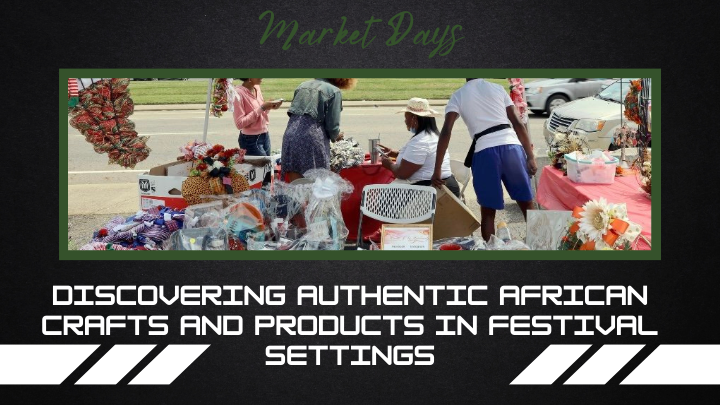Market Days
African festivals are not only about vibrant music, dance, and food—they are also fantastic places to explore the artistry, craftsmanship, and cultural heritage of the continent. Market days at these festivals provide a unique shopping experience, where visitors can find authentic African crafts, handmade goods, and specialty products that reflect the rich cultural diversity of Africa. Whether you’re looking for clothing, jewelry, art, or home décor, the vendor stalls at African festivals offer a treasure trove of items that are as unique as the continent itself. Here’s a look at the shopping experience at African festivals, and why you should not miss out on these colorful market days.
1. A Marketplace of Culture and Tradition
African festivals are an immersive experience that brings together vendors from across the continent, showcasing the skills and traditions of African artisans. From traditional crafts to modern, innovative designs, the stalls offer a broad range of products that celebrate Africa’s diversity. These market days provide an excellent opportunity to learn about the artistry behind each item while supporting local and international artisans.
What to Expect:
- Traditional Crafts: One of the biggest draws of African festivals is the opportunity to purchase traditional handcrafted items that hold cultural significance. This might include intricate beadwork, woven baskets, hand-carved wooden figures, or colorful fabrics. These crafts often have deep cultural roots, representing the unique heritage of various African tribes or regions. Vendors may even explain the history or symbolism behind their goods, offering an educational experience to buyers.
- Handmade Jewelry: African jewelry is known for its bold, vibrant designs, often using locally sourced materials such as beads, metals, wood, and gemstones. Popular items include statement necklaces, earrings, bangles, and anklets that showcase the diversity of African design. The jewelry often tells stories of ancestral traditions, social status, and local customs, making it a beautiful way to carry a piece of Africa’s cultural history.
- Textiles and Clothing: African textiles are vibrant, full of intricate patterns, and often carry cultural significance. Visitors can purchase everything from printed cotton fabrics to brightly colored dashikis, headwraps, and skirts. These textiles, made by local artisans, are a great way to bring African style into your wardrobe, while also supporting the livelihoods of the makers. Many festivals also feature live demonstrations of textile weaving and fabric printing, where you can see firsthand how these beautiful creations are made.
2. Unique Home Décor and Art
African festivals are an ideal setting to discover stunning pieces of art and home décor that infuse your living space with the beauty of Africa’s visual culture. Artists from various African countries showcase their work, offering an opportunity to bring home unique, one-of-a-kind pieces.
What to Expect:
- Paintings and Sculptures: You’ll find a wide range of artwork at African festivals, including traditional paintings, contemporary pieces, and handcrafted sculptures. From vibrant oil paintings depicting African landscapes and wildlife to bronze or wood sculptures of animals, people, or mythological figures, the art at these festivals reflects the deep connection between African culture, nature, and spirituality. Purchasing these pieces is a way to support African artists while adding a cultural touch to your home.
- Handwoven Baskets and Rugs: Baskets made from natural materials like sisal, palm leaves, and grass are common items at African festivals. These are often handcrafted using age-old techniques passed down through generations. Some baskets are dyed in bright, bold colors, while others feature intricate patterns or symbolic designs. Similarly, handwoven rugs and blankets made with natural fibers are beautiful, functional items that make excellent additions to any home.
- Wooden Carvings: One of the most iconic forms of African art is wooden carvings. At African festivals, you’ll find an array of finely crafted wooden items—ranging from figurines and masks to bowls and spoons. Each carving has its own unique story or cultural significance, and many are handcrafted by skilled artisans from specific African regions known for their wood carving traditions, such as West and Central Africa.
3. Spices, Oils, and Natural Products
In addition to the artistic and decorative products, African festivals are also a fantastic place to find natural products and ingredients that embody the continent’s healing traditions. Many vendors specialize in authentic African oils, herbs, spices, and beauty products, giving you a chance to bring a piece of Africa’s natural resources into your daily life.
What to Expect:
- Spices and Herbs: African cuisine is known for its bold, aromatic flavors, and many festivals feature stalls selling spices and herbs that are integral to African cooking. You’ll find everything from aromatic berbere spices (a staple in Ethiopian cooking) to fragrant Moroccan ras el hanout. These spices offer the chance to take home authentic flavors that will elevate your cooking and give you a taste of Africa’s culinary traditions.
- Natural Oils and Soaps: Many African festivals feature vendors selling natural beauty products made from indigenous plants. Shea butter, argan oil, baobab oil, and coconut oil are just a few of the offerings. These oils are known for their moisturizing and healing properties and are often used in skincare, haircare, and beauty treatments. Handmade soaps infused with essential oils like lavender or eucalyptus are also popular at these stalls, providing natural alternatives to commercial beauty products.
- Herbal Remedies and Teas: Some festivals feature stalls dedicated to African herbal remedies, teas, and wellness products. Herbal teas like rooibos, hibiscus, and lemongrass are common, as well as tinctures and oils made from African plants with known health benefits. These products, often made using ancient African knowledge, promote health and wellness while connecting you with nature’s resources.
4. Supporting Local and Global African Artisans
When you shop at African festivals, you’re not just buying a product—you’re supporting artisans and small businesses both locally and globally. Many vendors at these festivals are individuals or small cooperatives from Africa who rely on sales to sustain their craft and provide for their communities. By purchasing these items, you’re helping to preserve traditional arts and crafts while promoting economic development in African regions.
What to Expect:
- Fair Trade and Ethical Sourcing: Many festivals feature artisans who adhere to fair trade practices, ensuring that their products are ethically sourced and that artisans are paid fairly for their work. This is an important aspect of festival shopping, as it means your purchase is helping to empower African communities and sustain traditional craftsmanship.
- Cultural Exchange and Connection: When you buy from these vendors, you’re often buying directly from the artist or maker, which creates a deeper connection to the culture. Many artisans are happy to share the story behind their creations, whether it’s a traditional craft passed down through generations or a modern design influenced by African heritage. This cultural exchange fosters understanding and appreciation for African cultures.
5. A Celebration of African Heritage
The market days at African festivals offer more than just shopping—they are an integral part of the overall celebration of African heritage. As you walk through the bustling stalls, you’ll encounter a vibrant mix of colors, textures, and sounds that transport you to Africa. The opportunity to meet the artisans, hear their stories, and appreciate their craftsmanship adds depth to the shopping experience. It’s a celebration of culture, creativity, and connection, where visitors can take home a tangible piece of Africa while supporting the people who make these beautiful products.
Market days at African festivals are an essential part of the experience, offering a unique opportunity to discover authentic African crafts, handmade goods, and specialty products. From traditional artwork and jewelry to natural oils and spices, the stalls at these festivals provide something for everyone. Whether you’re looking to add a cultural touch to your home, explore African culinary traditions, or find one-of-a-kind gifts, these festivals are the perfect place to do so. Beyond the products, these market days foster cultural exchange, support local artisans, and help preserve Africa’s rich artistic heritage. Don’t miss out on the opportunity to discover something special at the next African festival you attend.



